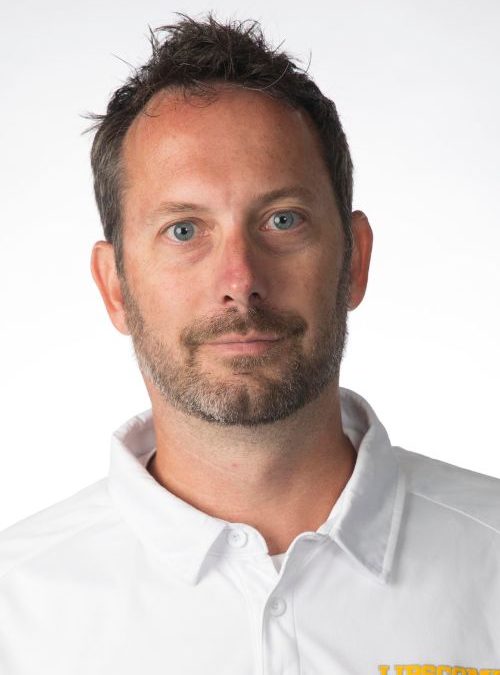Deep in the heart of Allen Arena, men’s soccer coach Charles Morrow reviews his team’s lineup for Saturday’s game in San Diego. Morrow, a 13-year fixture at Lipscomb still appears far more at home on the sideline of a soccer pitch than he does in his office, surrounded by soccer memorabilia, but this isn’t particularly surprising.
Morrow was introduced to soccer while growing up in a predominantly Latino school district near Corpus Christi, TX.
“When we went out to play at recess, we weren’t playing football; we were playing soccer,” Morrow said.
As a true freshman in 1994, Morrow played for Queens College in Charlotte, which he chose because it was a co-ed school with a growing soccer program.
“Good soccer and a lot of girls,” he noted, adding, “It sounded great.”
However, Morrow said he struggled in his freshman year with the transition from “a big fish in a small pond” in high school to “the lower half of the roster for sure, if not lower third” at Queens.
Despite this, Morrow pointed to this year as the year he realized that college soccer was what he wanted to do. Nevertheless, Morrow said the “party school” atmosphere got old.
“In the early nineties, Lipscomb was a school that Church of Christ parents could send their kid to and feel good that their kids would be safe and be taught the right things . . . . What you saw was ‘I’m here because my parents are making me go here. This is where they would pay for me to go to school,’” he said.
Morrow was looking for something else, but Lipscomb was not the kind of school he had in mind until he toured campus and decided Lipscomb was the place for him.
Morrow was named a team captain for the Bisons his sophomore year. His first two years at school he was a chemistry major, but because he changed majors, he had an extra year in school and helped out coaching during that year. After using up his eligibility, he became an assistant coach at Lipscomb.
Morrow graduated in 1997 with a degree in physical education and health and was named the head coach of Goodpasture Christian School’s boys and girls programs.
Since graduating, he has also served as an assistant coach at Vanderbilt and took his first collegiate head coaching position at Belmont Abbey University in 2003.
“Any time you move from an assistant to a head coaching role, there is a learning curve in terms of player management and things you think about in terms of planning,” Morrow noted.
Morrow, who had little prior experience with Catholicism, also faced a cultural learning curve to adapt to a small Catholic school like Belmont Abbey.
“My first year there, on Ash Wednesday,” Morrow reminisced, “I tried to wipe what I thought was dirt off the athletic director’s forehead, and no, it was ashes.”
In 2005, Morrow returned to Lipscomb as a head coach. Lipscomb had previously contacted him to take a coaching position at his alma mater shortly after he graduated, but Morrow instead elected to gain more experience with other programs.
“Initially, I did not think I wanted to come back because what I knew of Lipscomb was what I knew of it in the early nineties. Thankfully, I was open minded enough to listen.”
Morrow found that Lipscomb had expanded beyond what he saw as a religiously-homogeneous environment and developed a community of students who actually wanted to be there.
Morrow also found Lipscomb to be a school that was more committed to providing the funds to help all of its athletic teams succeed. While he was a student, Morrow said that basketball and baseball were the only two sports the school really funded to be successful, and that the other sports Lipscomb offered were primarily enrollment-sports to push and drive enrollment.
Morrow’s arrival marked a change in fortune for the Bisons, as they won twice as many games as they had in the previous two seasons.
“When I first came here, Lipscomb was the worst team in Division 1,” Morrow said. “I feel like we’ve really just scratched the surface of how successful we can be.”
In 2006, the Bisons defeated rival Belmont for the first time ever in Division 1 play.
Morrow and the Bisons notched 10-win seasons in both 2008 and 2010. 2014 proved to be the Bisons’ most successful season during Morrow’s tenure, which afforded them their first A-Sun regular season championship.
Under Morrow, the Bisons have reached the Atlantic Sun tournament seven times but have never advanced further than the semi-final round. Morrow has 90 wins, 115 losses and 22 ties as Lipscomb’s head coach.
Not growing complacent with the familiarity of the job, Morrow’s goals for his team remain lofty.
“This is a group that is experienced and talented enough to not only win the conference, but to make a run in the NCAA tournament,” Morrow said.
“I’ve been here 13 years in the coaching profession,” Morrow said. “To have not even applied for another job is really rare.
“On one hand, it’s hard to imagine myself being here the rest of my career; on the other hand I can’t imagine myself any other place.”
Photo courtesy of Lipscomb Athletics

